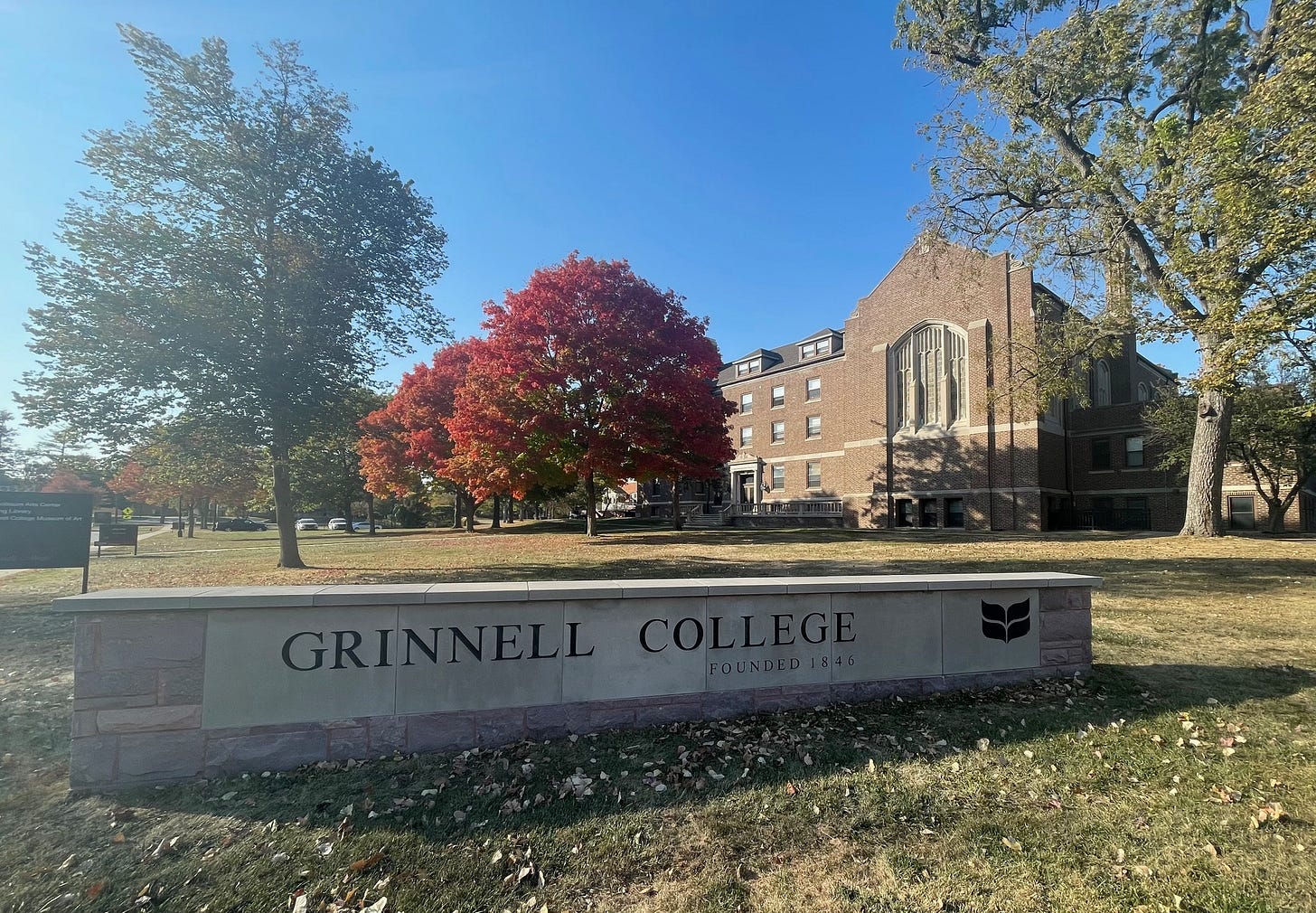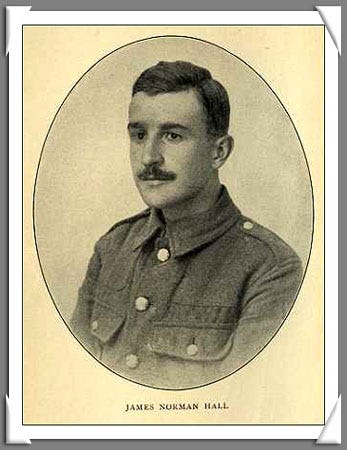Oh, Grinnell! Like “Millersville,” you’re swell!
The college and the town have always seemed to me to be rich in stories. And here’s one of them that needs to be told and re-told.
GRINNELL, Iowa – I hope my trip here a week ago for a Grinnell College football game produced a column that was informative and fun for readers. (If you missed reading it, please give it a try by clicking right here.)
As I was talking about the experience with friends later in the week, I remembered what was an informal rule of mine during two-plus decades of column writing for the Des Moines Register. Any time I found myself getting dull, but still needing a new column, I’d just follow the counsel in the chorus of “The Grinnell Alumni Song,” which says: Come ye back to old Grinnell, to the College loved so well.
When you’re on this campus, columns and stories seem to jump out and threaten to tackle you.
I could do a litany of the good tales Grinnell has given me over the last 52 years. (There was the one where I talked a cadre of Grinnell College science & math students into calculating for me where, if we lifted a one-inch thick skin of the entire surface of Iowa and wanted to balance it on a fence post – got that? – where would we put the post? They spent days working in the college’s “Computer Center,” then we drove to the spot they determined. It was neither in the town of State Center, nor unincorporated Iowa Center, but it was close – somewhere north of the town of Maxwell in Story County. It looked flat there.)
I got distracted.
My point today is that last week here, I realized three things about Grinnell College that need to be corrected: 1) Too few Grinnellians today know anything about the distinguished writer James Norman Hall, who graduated here in 1910, 2) no one seems to know or sing the classic anthem “Sons of Old Grinnell” that Hall wrote as an undergraduate, and 3) even fewer know about what we can call his “Millersville” caper.
Keep reading.
It was in early 1996 when I got drawn into this. We were celebrating Iowa’s Sesquicentennial – 150 years of statehood – and it was also Grinnell College’s Sesquicentennial. Stories about our history were hot.
Rich Ridgway, then the college’s public relations director and a great source for many of us in the news business, called and said, “I think we’ve got something here that has your name all over it.”
Actually, the names that were all over it were James Norman Hall and Jonathan Chenette.
Hall, a native of Colfax, Iowa, “was one of our most notable graduates, certainly one of our most romantic figures and, yes, probably one of our biggest characters,” Alan Jones, a retired history prof who had become the college’s historian, told me then. After his graduation, Hall “went to Europe to study the great romantic poets like Wordworth, Coleridge and Keats, just as World War I was erupting. He got carried away over there with the romance of war. He joined a British expeditionary force and started fighting in France, even before the U.S. entered the war.”
James Norman Hall at the time of World War I.
When the U.S. finally did get involved, Hall joined the U.S. Army Air Corps, was assigned with other Americans as a fighter pilot with France’s “Lafayette Escadrille,” shot down five German planes, and was decorated as an “ace” and war hero.
After the war, he decided the modern world was becoming crazed by technology. Worn out by that and by war, Hall wanted to get away from it all – and in 1919 moved to Tahiti with a war buddy and fellow writer, Charles Nordhoff. At first, they lived in grass huts on the beach.
In 1932, they collaborated to write “Mutiny on the Bounty,” which became an instant best seller, later a beloved adventure movie, and it made them both financially secure so they could continue their writing careers at whatever pace felt right. Hall was a featured columnist for several years in the esteemed “Atlantic Monthly” magazine, based in New York City.
Hall lived the rest of his life in Tahiti. He married a Tahitian woman of English ancestry and they had two children. He made several trips back to the U.S., promoting new books, visiting friends and relatives in Colfax and at Grinnell College. He died in 1951 and is buried in Tahiti.
Now, back to early 1996. As the college was celebrating 150 years, a number of professors and even notable alumni taught mini-classes on interesting chapters in the history of both the school and the state.
One of those presentations was “Oh Millersville!” by Jonathan Chenette, who was then a Grinnell College music professor and a composer who was already achieving considerable acclaim.
That’s when I got the tip that there was a very intriguing story to this.
Jonathan Chenette is now retired in New Mexico. During his stellar career in higher education, he served as a music professor at Grinnell College and at Vassar College in Poughkeepsie, N.Y. In addition, he served as the college dean at Vassar and even its acting and interim president during two leadership changes there. (Chenette family photo)
“In 1986 or so, I’d been given a leave from Grinnell to write a new opera, and I wanted somehow for it to engage Iowa, the prairie or the ways we live,” Chenette told me Friday in a phone call from Santa Fe, New Mexico. He’s living there after going from Grinnell to Vassar College in 2008 and retiring from Vassar earlier this year after a very distinguished 16 years there.
“So, I went over to Burling Library at Grinnell, and went into its collection of Iowa books,” he recalled. “I was browsing at titles on the books lined up on the shelves, and I came across one that was not very thick, ‘Oh Millersville!’ by a ‘Fern Gravel’.”
Published in 1941, it seemed to be a reflection in 58 simplistic poems about the almost idyllic life in little Millersville, Iowa, written by this author Gravel, who was just 12 years old.
Here’s the start of one of the poems:
Of all the different states in our country so grand
Iowa is the best, and that is my land.
It raises more corn than any other state
And we ship thousands of hogs and cattle to Chicago by freight…
Here’s another:
Oh, it is wonderful in Millersville
On many a winter night,
When the ground is covered with snow
And the moon is shining so bright.
You can hear the sleigh-bells jingling
Everywhere around.
I don’t think there could be
A more beautiful sound.
And another, when the young poet was realizing there might be more in the outside world:
Millersville, Oh Millersville!
This is my home and I like it, but still
I wish that once in a while I could go
To cities like Omaha and St. Jo.
With few other books being published because of the war, the publisher distributed “Oh Millersville!” to potential reviewers, mainly at newspapers across the nation. They went nuts for it, hailing it as a “welcome relief” and “a real spirits-booster” in that frantic war era.
“We have found the lost Sappho of Iowa!” gushed the New York Times, bringing in the name of a great Greek poet.
“So good that it hurts!” the Washington Post said. “Fern Gravel never dreamed that she was writing social history.”
Even the home state Des Moines Register went for it, apparently never checking to realize that there is no “Millersville” in Iowa. Millersburg, yes. Millerton, yes. Millersville, no.
Paul Engle, who eventually founded the Writers Workshop at the University of Iowa, reviewed the book for the Register and wrote: “There is so warm a feeling of validity about these verses, and so accurate a sense of individual character, their final impact is far stronger than a simple amusement at girlish simplicity… This is majestic fooling.”
Indeed, it was.
In 1946, James Norman Hall wrote a confession in the Atlantic Monthly magazine that “Oh Millersville!” was a literary hoax, a grand one!
There was no “Fern Gravel.” Hall himself had written all the poems, imagining how his sister, at the age of 12, might have described their hometown of Colfax.
Were Hall, the publisher and perhaps even the book reviewers all in cahoots on this ruse? Hall said no. But with our skeptical minds today, some will wonder.
Regardless, “Oh! Millersville!” was a delightful and artful surprise in a dark time that needed one.
In 1996, Clarence Andrews, then a retired professor of English and journalism at the University of Iowa, told me he’d been so delighted when he eventually learned the full story of “Oh Millersville!” that he had it republished in 1979. If you can find the Andrews’ re-publication, it contains the original “Fern Gravel” poems, as well as several of those lavish reviews of the book, as well as Hall’s later “confession” in the Atlantic Monthly.
Once Professor Chenette figured it all out, back in 1986, he still was able to turn the poems into lyrics for inspiring, sometimes soaring operatic numbers for piano and soprano. And the Dubuque Symphony had him orchestrate it, and it was subsequently performed by classical ensembles in cities across the state, especially during the Sesquicentennial year of ’96.
“One cool thing that happened as I was putting all this together,” Chenette told me Friday, “was that I felt like I should try to get permission from James Norman Hall’s heirs to use the poems as lyrics in my compositions. They gave permission right away, and I got a note back from his children or maybe grandchildren, recalling how as kids, they’d be called into James Norman Hall’s writing studio in Tahiti. They’d sit on his lap; he’d read them the ‘Fern Gravel’ poems and he’d laugh and laugh with them.”
“Oh Millersville!”
Oh, Grinnell!
--
You can comment on this column below or write the columnist directly by email at chuck@offenburger.com.
--
A NOTE TO MY READERS: I write this column, “Iowa Boy Chuck Offenburger,” as a member of the Iowa Writers’ Collaborative. You can subscribe for free. However, if you enjoy my work, please consider showing your support by becoming a paid subscriber at whatever level feels right for you. The Iowa Writers Collaborative is made up of some of the foremost regional journalists in the country. Each writer is independent and has a Substack of their own.
Linking readers and professional writers who care about Iowa.







What great circuitry, worth a re-read.
I think Engle saw through it at the time: "This is majestic fooling"--but of course did not know by whom.
Best thing I have read in years...thanks!!!